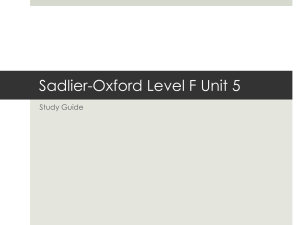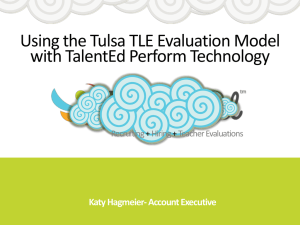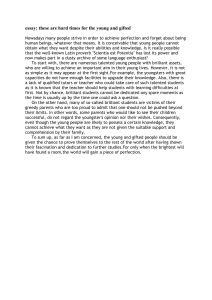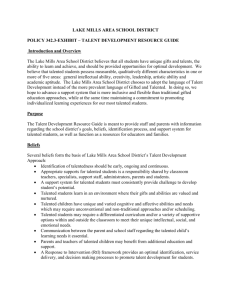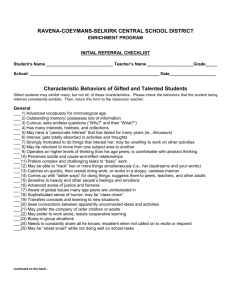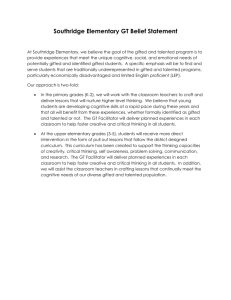More Able And Talented
advertisement
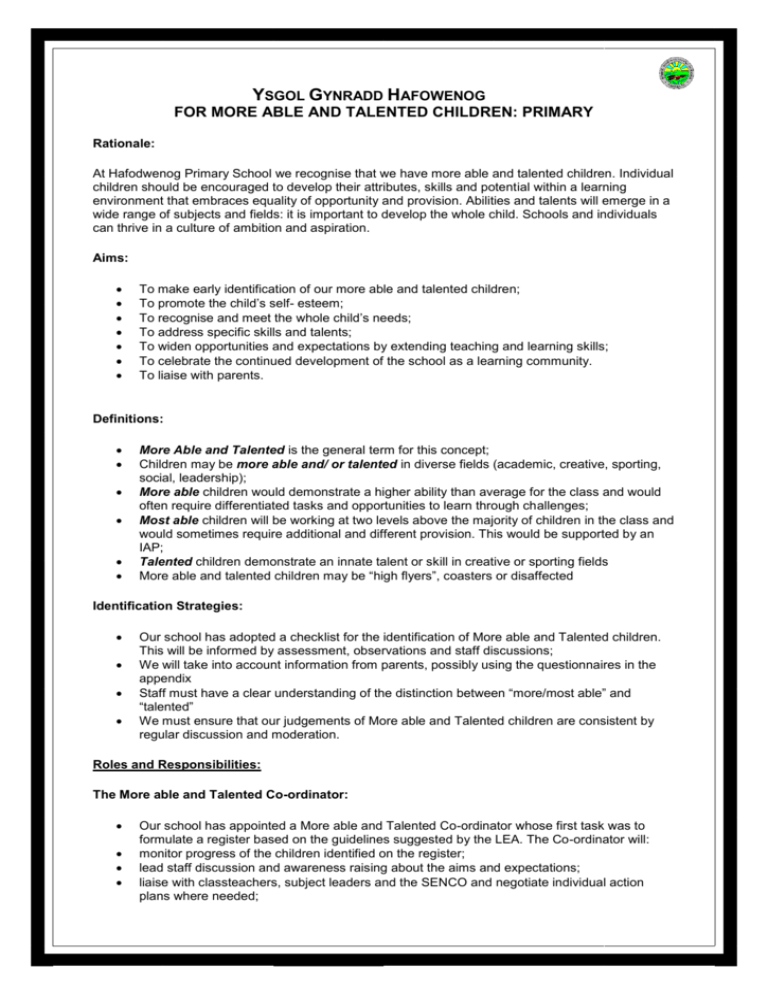
YSGOL GYNRADD HAFOWENOG FOR MORE ABLE AND TALENTED CHILDREN: PRIMARY Rationale: At Hafodwenog Primary School we recognise that we have more able and talented children. Individual children should be encouraged to develop their attributes, skills and potential within a learning environment that embraces equality of opportunity and provision. Abilities and talents will emerge in a wide range of subjects and fields: it is important to develop the whole child. Schools and individuals can thrive in a culture of ambition and aspiration. Aims: To make early identification of our more able and talented children; To promote the child’s self- esteem; To recognise and meet the whole child’s needs; To address specific skills and talents; To widen opportunities and expectations by extending teaching and learning skills; To celebrate the continued development of the school as a learning community. To liaise with parents. Definitions: More Able and Talented is the general term for this concept; Children may be more able and/ or talented in diverse fields (academic, creative, sporting, social, leadership); More able children would demonstrate a higher ability than average for the class and would often require differentiated tasks and opportunities to learn through challenges; Most able children will be working at two levels above the majority of children in the class and would sometimes require additional and different provision. This would be supported by an IAP; Talented children demonstrate an innate talent or skill in creative or sporting fields More able and talented children may be “high flyers”, coasters or disaffected Identification Strategies: Our school has adopted a checklist for the identification of More able and Talented children. This will be informed by assessment, observations and staff discussions; We will take into account information from parents, possibly using the questionnaires in the appendix Staff must have a clear understanding of the distinction between “more/most able” and “talented” We must ensure that our judgements of More able and Talented children are consistent by regular discussion and moderation. Roles and Responsibilities: The More able and Talented Co-ordinator: Our school has appointed a More able and Talented Co-ordinator whose first task was to formulate a register based on the guidelines suggested by the LEA. The Co-ordinator will: monitor progress of the children identified on the register; lead staff discussion and awareness raising about the aims and expectations; liaise with classteachers, subject leaders and the SENCO and negotiate individual action plans where needed; purchase and organise resources, keep abreast of new developments and have a knowledge of specialist facilities; offer advice and support for parents Class teachers: The class teacher will liaise with the More Able and Talented Co-ordinator over the early identification of more able and talented children in his/ her class; The class teacher should discuss planning for most able and talented children with the Coordinator so as to ensure (s)he meets their needs; Class teachers should use a variety of strategies to meet the needs of more able and talented children (see section on Learning and Teaching below); The class teacher should keep parents informed; The class teacher should produce an IAP for those most able/talented children who require additional and different provision. Parents/ carers: We want our parents/ carers to be aware that we are committed to meeting the needs of all our children. Parents of children who are most able and talented will be made aware of this and their child’s IAPs will be shared with them. The child: The school aims to provide a stimulating learning environment for all its children, this includes the more able and talented child; Most able and talented children will be asked to contribute towards the formulation of their IAPs and subsequent evaluation. Governors: The governing body will be responsible for ensuring that this policy is fully implemented; A governor has been given specific responsibility for children who are more able and talented; The Annual Governors’ Report to Parents will comment on the implementation of this policy. LEA Co-ordinator: The LEA Co-ordinator will assist schools with their teaching of more able and talented children; The Co-ordinator will facilitate in- service training for schools and organise special events for More Able and talented children. Partnership and Communication: All more able and talented children will be entered on the school’s database. The school will register most able and talented children on the LEA database. This information will be passed on throughout the school and to the next phase; Class teachers will liaise with the More able and Talented Co-ordinator so as to make appropriate provision for these children; The school will share IAPs for most able and talented children with their parents/ carers; Where necessary and appropriate the school will link up with the LEA Co-ordinator, external providers and industrial links; The school brochure will contain a section on provision for more able and talented children. Organisation: The school’s policy for more able and talented children will work within the framework of the curriculum policy; Teachers and children will share expectations for lessons; Staff will make flexible and efficient use of resources; Teachers will deploy appropriate teaching styles (see following section) with children and evaluate their outcomes; Teachers will use their assessments to inform future planning; There will be sufficient differentiation for all children, offering sufficient challenge for the more able. Learning and Teaching: Teaching and learning strategies should include where appropriate: Setting for literacy and numeracy; Varying groups to suit tasks; Extension opportunities; Child initiated learning opportunities; Differentiated teacher questioning; Targeted use of classroom assistants; Adopting a problem solving approach; Adopting a skills based approach; Awareness of learning styles; Special tasks of responsibility; Visits by experts; Consultation with LEA Co-ordinator; Use of more able and talented children as tutors Monitoring and Evaluation: All monitoring and evaluation should reflect the school’s self-evaluation procedures and monitoring and evaluation policy; The More Able and Talented Children Register together with children’s IAPs should be regularly monitored and reviewed by the co-ordinator; Children should be aware of testing data and the IAP review process so that they can be instrumental in setting their own learning targets; The co-ordinator should liaise regularly with the governor with responsibility for more able and talented children; The governing body will comment in their Annual Review on progress and developments in implementing this policy. Signed: Date: September 2012 Mrs V Griffiths
